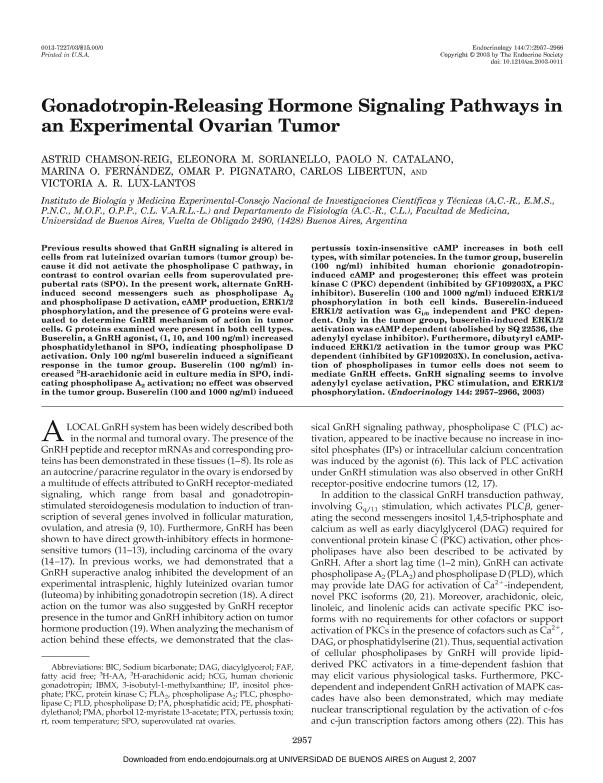Artículo
Gonadotropin-Releasing Hormone signaling pathways in an experimental ovarian tumor
Chamson de Reig, Astrid ; Sorianello, Eleonora Mariana
; Sorianello, Eleonora Mariana ; Catalano, Paolo Nicolás
; Catalano, Paolo Nicolás ; Fernandez, Marina Olga
; Fernandez, Marina Olga ; Pignataro, Omar Pedro
; Pignataro, Omar Pedro ; Libertun, Carlos
; Libertun, Carlos ; Lux, Victoria Adela R.
; Lux, Victoria Adela R.
 ; Sorianello, Eleonora Mariana
; Sorianello, Eleonora Mariana ; Catalano, Paolo Nicolás
; Catalano, Paolo Nicolás ; Fernandez, Marina Olga
; Fernandez, Marina Olga ; Pignataro, Omar Pedro
; Pignataro, Omar Pedro ; Libertun, Carlos
; Libertun, Carlos ; Lux, Victoria Adela R.
; Lux, Victoria Adela R.
Fecha de publicación:
07/2003
Editorial:
Endocrine Society
Revista:
Endocrinology
ISSN:
0013-7227
e-ISSN:
1945-7170
Idioma:
Inglés
Tipo de recurso:
Artículo publicado
Clasificación temática:
Resumen
Previous results showed that GnRH signaling is altered in cells from rat luteinized ovarian tumors (tumor group) because it did not activate the phospholipase C pathway, in contrast to control ovarian cells from superovulated prepubertal rats (SPO). In the present work, alternate GnRH-induced second messengers such as phospholipase A(2) and phospholipase D activation, cAMP production, ERK1/2 phosphorylation, and the presence of G proteins were evaluated to determine GnRH mechanism of action in tumor cells. G proteins examined were present in both cell types. Buserelin, a GnRH agonist, (1, 10, and 100 ng/ml) increased phosphatidylethanol in SPO, indicating phospholipase D activation. Only 100 ng/ml buserelin induced a significant response in the tumor group. Buserelin (100 ng/ml) increased (3)H-arachidonic acid in culture media in SPO, indicating phospholipase A(2) activation; no effect was observed in the tumor group. Buserelin (100 and 1000 ng/ml) induced pertussis toxin-insensitive cAMP increases in both cell types, with similar potencies. In the tumor group, buserelin (100 ng/ml) inhibited human chorionic gonadotropin-induced cAMP and progesterone; this effect was protein kinase C (PKC) dependent (inhibited by GF109203X, a PKC inhibitor). Buserelin (100 and 1000 ng/ml) induced ERK1/2 phosphorylation in both cell kinds. Buserelin-induced ERK1/2 activation was G(i/0) independent and PKC dependent. Only in the tumor group, buserelin-induced ERK1/2 activation was cAMP dependent (abolished by SQ 22536, the adenylyl cyclase inhibitor). Furthermore, dibutyryl cAMP-induced ERK1/2 activation in the tumor group was PKC dependent (inhibited by GF109203X). In conclusion, activation of phospholipases in tumor cells does not seem to mediate GnRH effects. GnRH signaling seems to involve adenylyl cyclase activation, PKC stimulation, and ERK1/2 phosphorylation.
Palabras clave:
Gnrh
,
Ovario
,
Tumor
,
Signal Transduction
Archivos asociados
Licencia
Identificadores
Colecciones
Articulos(IBYME)
Articulos de INST.DE BIOLOGIA Y MEDICINA EXPERIMENTAL (I)
Articulos de INST.DE BIOLOGIA Y MEDICINA EXPERIMENTAL (I)
Citación
Chamson de Reig, Astrid; Sorianello, Eleonora Mariana; Catalano, Paolo Nicolás; Fernandez, Marina Olga; Pignataro, Omar Pedro; et al.; Gonadotropin-Releasing Hormone signaling pathways in an experimental ovarian tumor; Endocrine Society; Endocrinology; 144; 7; 7-2003; 2957-2966
Compartir
Altmétricas



